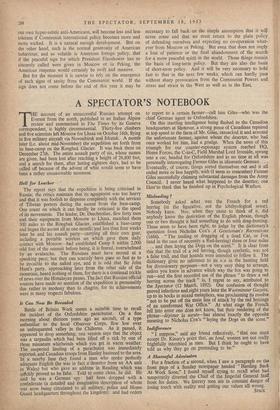It Can Now Be Revealed Battle of Britain Week seems
a suitable time to recall the incident of the Oxfordshire parachutist. On a fine morning about thirteen years ago an aircraft, of a type unfamiliar to the local Observer Corps, flew low over an unfrequented valley in the Chilterns. As it passed, it appeared to drop something; one version says that the object was a tarpaulin which had been lifted off a rick by one of those miniature whirlwinds which you get in warm weather. The suspected landing of a parachutist was immediately reported, and Canadian troops from Henley hastened to the area. In a nearby lane they found a man who spoke perfectly adequate English (he was in fact a deserter from an AA unit in Wales) but who gave an address in Reading, which was qiiickly proved to be false. Told to come clean, he did. He said he was a German spy : had been dropped with a confederate (a detailed and imaginative description of whom was soon being circulated to all military, police and Home Guard headquarters throughout the kingdom): and had orders to report to a certain farmer—call him Giles—who Was the chief German agent in Oxfordshire.
On this startling intelligence being flashed to the Canadian headquarters at Sbotover, a strong posse of Canadians repaired at top speed to the farm of Mr. Giles, ransacked it and arrested the unfortunate farmer, against whom the deserter, who had once worked for him, had a grudge. When the news of this triumph for our counter-espionage system reached HQ, Home Forces, the C-in-C, Field Marshal Lord Ironside, sprang into a car, headed for Oxfordshire and in no time at all was personally interrogating Farmer Giles in idiomatic German. . . . Eventually, of course, things sorted themselves out and it all ended more or less happily, with (I seem to remember) Farmer Giles successfully claiming substantial damages from the Army Council. I never heard what happened to the deserter; one likessto think that he finished up in Psychological Warfare.


































 Previous page
Previous page